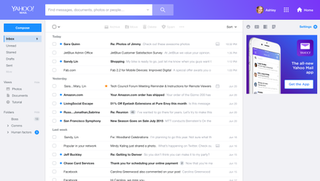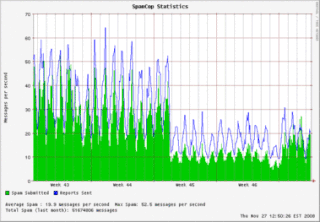
AOL is an American web portal and online service provider based in New York City, and a brand marketed by Yahoo! Inc.
Netscape Communications Corporation was an American independent computer services company with headquarters in Mountain View, California, and then Dulles, Virginia. Its Netscape web browser was once dominant but lost to Internet Explorer and other competitors in the so-called first browser war, with its market share falling from more than 90 percent in the mid-1990s to less than one percent in 2006. An early Netscape employee Brendan Eich created the JavaScript programming language, the most widely used language for client-side scripting of web pages and a founding engineer of Netscape Lou Montulli created HTTP cookies. The company also developed SSL which was used for securing online communications before its successor TLS took over.

Spamming is the use of messaging systems to send multiple unsolicited messages (spam) to large numbers of recipients for the purpose of commercial advertising, for the purpose of non-commercial proselytizing, for any prohibited purpose, or simply repeatedly sending the same message to the same user. While the most widely recognized form of spam is email spam, the term is applied to similar abuses in other media: instant messaging spam, Usenet newsgroup spam, Web search engine spam, spam in blogs, wiki spam, online classified ads spam, mobile phone messaging spam, Internet forum spam, junk fax transmissions, social spam, spam mobile apps, television advertising and file sharing spam. It is named after Spam, a luncheon meat, by way of a Monty Python sketch about a restaurant that has Spam in almost every dish in which Vikings annoyingly sing "Spam" repeatedly.

Email spam, also referred to as junk email, spam mail, or simply spam, is unsolicited messages sent in bulk by email (spamming). The name comes from a Monty Python sketch in which the name of the canned pork product Spam is ubiquitous, unavoidable, and repetitive. Email spam has steadily grown since the early 1990s, and by 2014 was estimated to account for around 90% of total email traffic.

Yahoo! Mail is an email service offered by the American company Yahoo, Inc. The service is free for personal use, with an optional monthly fee for additional features. Business email was previously available with the Yahoo! Small Business brand, before it transitioned to Verizon Small Business Essentials in early 2022. Launched on October 8, 1997, as of January 2020, Yahoo! Mail has 225 million users.
DoubleClick Inc. was an American advertisement company that developed and provided Internet ad serving services from 1995 until its acquisition by Google in March 2008. DoubleClick offered technology products and services that were sold primarily to advertising agencies and mass media, serving businesses like Microsoft, General Motors, Coca-Cola, Motorola, L'Oréal, Palm, Inc., Apple Inc., Visa Inc., Nike, Inc., and Carlsberg Group. The company's main product line was known as DART, which was intended to increase the purchasing efficiency of advertisers and minimize unsold inventory for publishers.

Google Talk was an instant messaging service that provided both text and voice communication. The instant messaging service was variously referred to colloquially as Gchat, Gtalk, or Gmessage among its users.
SpamCop is an email spam reporting service, allowing recipients of unsolicited bulk or commercial email to report IP addresses found by SpamCop's analysis to be senders of the spam to the abuse reporting addresses of those IP addresses. SpamCop uses these reports to compile a list of computers sending spam called the "SpamCop Blocking List" or "SpamCop Blacklist" (SCBL).

Zimbra Collaboration, formerly known as the Zimbra Collaboration Suite (ZCS) before 2019, is a collaborative software suite that includes an email server and a web client.

Openwave Systems Inc. is a division of Enea. It provides video traffic management and 5G mobile products.

Blue Frog was a freely-licensed anti-spam tool produced by Blue Security Inc. and operated as part of a community-based system which tried to persuade spammers to remove community members' addresses from their mailing lists by automating the complaint process for each user as spam is received. Blue Security maintained these addresses in a hashed form in a Do Not Intrude Registry, and spammers could use free tools to clean their lists. The tool was discontinued in 2006.
Skyriver was a business broadband Internet provider headquartered in San Diego, California. It was acquired by One Ring Networks in July, 2018. Skyriver delivered broadband Internet connectivity for enterprise and small-medium businesses, utilizing its proprietary millimeter wave technology. Skyriver offered commercial grade services including dedicated Internet access, Virtual Private Network (VPN), redundancy, and temporary Internet/event bandwidth in California.

Outblaze is a technology company that develops and provides digital media products and services including smartphone games and other apps, social media applications, computer and video games, online transaction systems, and web communication software. Although it started out as an application service provider of hosted Web applications, the company gradually transitioned to the video game industry. In 2009 Outblaze sold its messaging business unit in order to focus primarily on digital entertainment.
Brightmail Inc. was a San Francisco–based technology company focused on anti-spam filtering. Brightmail's system has a three-pronged approach to stopping spam, the Probe Network is a massive number of e-mail addresses established for the sole purpose of receiving spam. The Brightmail Logistics and Operations Center (BLOC) evaluates newly detected spam and issues rules for ISPs. The third approach is the Spam Wall, a filtering engine that identifies and screens out spam based on the updates from the BLOC.

Usenet, USENET, or, "in full", User's Network, is a worldwide distributed discussion system available on computers. It was developed from the general-purpose Unix-to-Unix Copy (UUCP) dial-up network architecture. Tom Truscott and Jim Ellis conceived the idea in 1979, and it was established in 1980. Users read and post messages to one or more topic categories, known as newsgroups. Usenet resembles a bulletin board system (BBS) in many respects and is the precursor to the Internet forums that have become widely used. Discussions are threaded, as with web forums and BBSes, though posts are stored on the server sequentially.

McColo was a US-based web hosting service provider that was, for a long time, the source of the majority of spam-sending activities for the entire world. In late 2008, the company was shut down by two upstream providers, Global Crossing and Hurricane Electric, because a significant amount of malware and botnets had been trafficking from the McColo servers.

Sparrow was an email client for OS X and iOS. After a 4-month beta period, Sparrow went on sale in the Mac App Store on February 9, 2011 and became the top paid and top grossing app in less than one day. On July 20, 2012, the company announced that it had been acquired by Google and was ceasing continued development of the application except for critical bug fixes.

Newton is an email management application for iOS, Android, MacOS, Windows and ChromeOS developed by CloudMagic, Inc. The application is known for its searching capabilities, cross-platform abilities and user interface. It has been referred to as an email client better than Gmail's native app. As from September 15, 2016, CloudMagic has been renamed to Newton Mail with premium services, adding a host of new features and functions.










